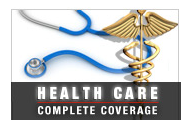My family’s rocky journey through the health care system over the last five years has included more than a half-dozen emergency room visits (I've lost exact count); five stays in three different acute-care hospitals; one pediatric intensive care episode and countless treatments and tests in clinics and hospital diagnostics units.
So shopping for an affordable health plan on the new Affordable Care Act (ACA) marketplace, HealthCare.gov, wasn't an academic or journalistic exercise for me. Since we haven't been covered by a group policy in a dozen years, I really wanted to find affordable coverage that made sense for us.
In the first week of the new marketplace, at least, it wasn’t an easy task.
We were nearly ideal customers for the exchange. I have been buying individual policies since 2001, when I was last on salary with an employer that offered a group plan (I've been working on contract as a freelancer for more than a decade). Since we signed up for a catastrophic plan to save money, there were significant drawbacks: No coverage for immunizations, dental, eye care, check-ups/doctor visits, prescription drugs or lab tests.
With two young children and a $6,000 annual deductible, we were spending from $12,000 to $15,000 annually on out-of-pocket expenses. That includes $7,200 on premiums with the latest rate hike, which came in like clockwork the middle of this year.
That's not to say that the catastrophic plan didn't provide coverage for major medical expenses. When my wife was diagnosed with breast cancer and underwent surgery, chemotherapy and radiation therapy in 2009, it covered all but the deductible and prescription drugs. The hundreds of thousands in bills would've bankrupted us without insurance.
Prior to the Affordable Care Act, we would've been hostage to our present insurer since my wife's illness made her "uninsurable" under the old underwriting standards. Now pre-existing conditions can't bar you from coverage. As such, that's one of the best consumer protection provisions in a generation.
Still, the out-of-pocket costs with a growing family can be vexing with a catastrophic plan, so knowing that even the most basic policies had "essential benefits" such as prescription drugs, lab services and oral care had a nice ring to it. The catch, though, would be the cost of the premium.
We're also good candidates for a more comprehensive policy since, as I mentioned, we've utilized quite a bit of health care in the past five years. Although everything in a hospital was covered – once we met our deductible – periodic expenses like tests ordered from doctor's offices, drugs, dental and eye care are not. Just getting out-of-pocket expenses down to under a thousand dollars a year would be progress.
VETTING A PLAN WAS SLOW GOING
On the morning of Oct. 1, when I clicked on to see some policies from my state, the message was that the system was down. It had crashed due to overwhelming demand. The government projected up to 60,000 simultaneous users, but got swamped by more than four times that volume.
According to USA Today, HealthCare.gov's designers based their server needs on Medicare.gov volume, which ran up to 30,000 users a day. Somebody had badly estimated the ACA volume and perhaps the mass motivation of the users.
I waited a few days and tried again on Sunday night – no dice. Monday night was slightly better since the government upgraded its software and added server capacity over the weekend, although I was stymied by an "identity verification" glitch. That particular niche service was outsourced to the credit reporting firm Experian, but when I called them they were closed. At this point, HealthCare.gov was hitting an annoyance level akin to my myriad technical problems with my telecom provider.
It's easy to understand why the system was bogged down, though.
On the first day, the new site got more than 3 million visitors, which is enough to reach viral status for most YouTube videos. By the end of the week, I was among the 8 million people trying to get onto the site. Clearly, millions wanted information and wanted to apply for a policy. I had plenty of company.
AN EXPERIMENT IN MARKET ECONOMICS
I had another reason for obtaining a policy through the exchange other than trying to save money: I wanted to see if this experiment in hybrid market economics that combined private insurers with a public exchange would work.
What many don't know about the ACA is that private insurance companies will still set premiums based on local medical costs, utilization, whether you smoke (costs are higher) and your age. But they can't "underwrite" based on pre-existing conditions.
For example, utilization of health care in Illinois is much higher in the Northeastern part of the state, that is, the Chicago metropolitan area (as it is in most urban areas), compared to downstate or by the Mississippi River. In fact, the highest prices were in the "collar" counties of Lake, McHenry, Kane and DuPage (I live in Lake County), which wasn't good news for me.
According to an analysis by the Associated Press, the lowest-cost "silver" plan, a benchmark for affordable premiums, was a bargain $268 per month for a 50-year-old in Mercer County (population: 16,000), in the northwestern part of the state along the Mississippi. The same person in Kane County (just west of Chicago) would pay $300 more a year. Of course, pricing insurance based on prevailing local medical costs is hardly new and doesn't break any new ground in insurance coverage.
I'm also leery about whether insurers will resort to offering low-ball "teaser" prices to get your business for a year, then ratchet up premiums after you've been insured for a while. In my experience, that's been a perennial bug-a-boo; I've never seen premiums adjusted downward.
Another concern is what kinds of arrangements the insurers have negotiated with local networks of hospitals. Will my doctor and local hospitals be part of the plan we ultimately choose? Would we be willing to switch providers if they weren't?
We've faced that dilemma before when our family doctor was bumped from a network after an employer changed insurers. When that last happened – in the middle of the pregnancy of our second daughter – we chose to pay out of pocket and negotiate a fee ourselves with our baby doctor rather than change physicians.
In any case, the success or failure of the ACA exchanges will largely hinge on choice, service and price, the golden pillars of our consumer society. If they are lacking in a significant way across the country, the ACA will not garner enough political support to survive.
So far, I can't make a personal evaluation on either choice or price, but service is definitely getting a failing grade. While the ACA marketplace isn't worth a government shutdown, I would like to see it up and running properly so that I can give it a fair shot.
More next week…







